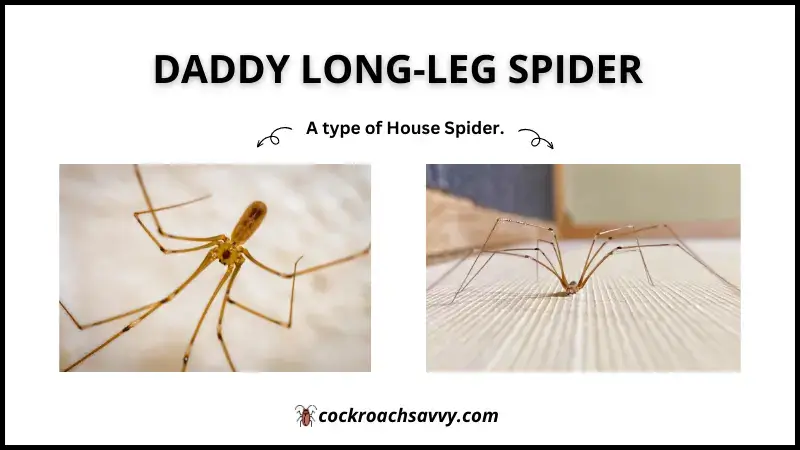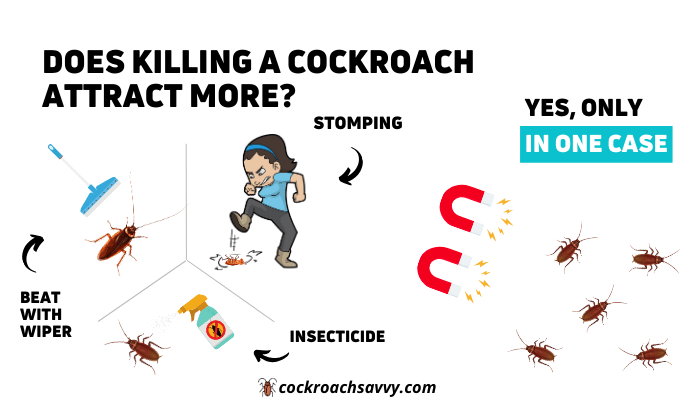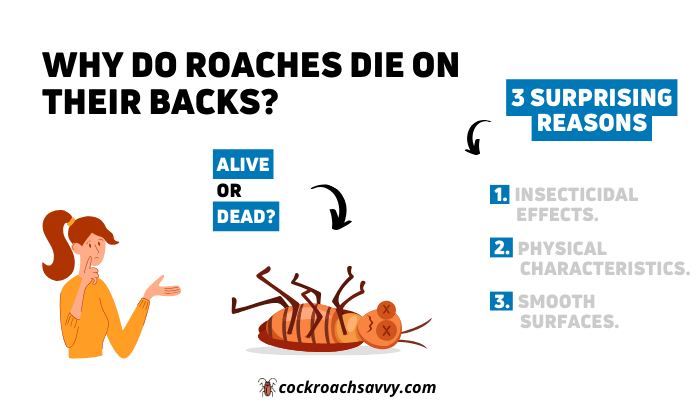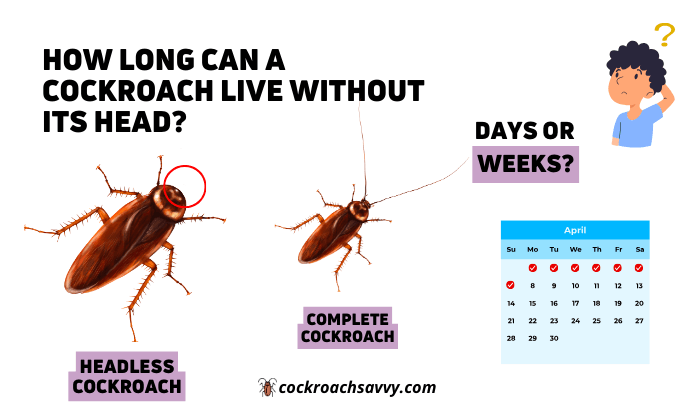Roach Invasion?
Let the Spiders Help…
Spiders and cockroaches have long been and still are known as unwelcome housemates, causing fear and disgust for many.
However, did you know that these two creepy crawlers engage in a battle against each other, with spiders often coming out as the victor?
Certain types of spiders, including jumping spiders, American house spiders, and huntsman spiders, are capable of consuming roaches and their eggs. This makes having a spider in your home potentially beneficial for natural pest control, especially if you have a smaller roach infestation.
Some people believe that spiders are the ultimate roach predators, while others argue that this is just a myth. But have you ever wondered if spiders really eat roaches?
In this article, we will discuss the battle between spiders and roaches, which spider species can eat roaches, and the truth behind many age-old questions such as “Do spiders eat cockroaches?”
Let’s begin the great debate.
Do Spiders Eat Cockroaches?
Yes, spiders eat cockroaches.
But, wait will they help me in my roach problem?
Well, it depends on the situation.
Let me explain,
Spiders can help stop cockroach problems in certain situations, but not in the case of existing infestations.
If a spider catches a newly arrived cockroach looking for a place to lay eggs, it can prevent an infestation from starting. However, if there is already a cockroach infestation in your home, spiders alone cannot eliminate it.”
Let’s have some facts,
- Spiders are voracious predators that can consume a wide range of insects and other arthropods, including cockroaches.
- Cockroaches, being one of the most common pests, are a particularly tasty treat for spiders.
- Spiders are either skilled hunters or have exceptionally strong webs to trap their prey.
So, rest assured, if there are NO cockroaches in your home because these eight-legged predators won’t let new roaches in your home.
And if roaches try to come to your house, these spiders won’t hesitate to make them their next meal! before they start lying eggs.
Spiders That Eat Cockroaches
Here is a summary of the whole article.
| Spider Species | Eat Roaches | Have Venom | Bite Humans | Dangerous for Humans |
|---|---|---|---|---|
| House Spiders | Yes | Yes – Not poisonous | Yes – If provoked | No |
| Wolf spiders | Yes | Yes – isn’t deadly | Yes – If feel threatened | No |
| Huntsman Spiders | Yes – Actively | Yes | Yes – serious defensive bites | Not considered Dangerous |
| Jumping Spiders | Yes | Yes | Yes – Have large fangs | No |
| Running spiders | Yes | Yes | Yes – it’s painful | No |
| Brown recluse spiders | Yes | Yes – powerful venom | Yes – If provoked | Yes |
| Widow spiders | Yes | Very Venomous | Yes | Yes – Sometimes may lead to death |
| Tarantulas | Yes | Yes | Yes – feels like a bee sting | NO – (May cause allergic reactions) |
1. House Spiders

Do House Spiders Eat Cockroaches?
Yes, It’s true that house spiders can eat cockroaches, but they usually target smaller roaches as their prey.
The term “house spider” contains a variety of different species, including the:
- Brown recluse spider
- Jumping spider
- Wolf spider
- Hobo spider
- Sac spider
- Daddy long-leg spiders
Out of these species, the American house spider is most commonly found in households and is generally harmless to humans. This spider typically preys on insects that lack defensive capabilities and can easily become trapped in its webs.
However, larger roaches like the American cockroach are more resistant to the house spider’s web and may be able to break out.
Another type of house spider is the Daddy long-leg spider which is also unable to eat roaches due to its small mouth and the thickness of the roach’s outer shell. Also, their webs may not be strong enough to trap larger roaches.

So, if you’re looking for spiders to use as natural roach control, it’s best to choose larger species that are better equipped to capture and ingest larger insects.
House Spiders Appearance:
American house spiders are small with a yellow-brown color, thin legs with dark rings, and round abdomen.
They can only eat smaller roaches like brown-banded roaches trapped in their webs and have limited vision, only seeing objects within 3 or more inches in front of them.
Are House Spiders Poisonous?
Most house spiders are not poisonous to humans, and their bites are usually harmless to people. They do possess venom glands, but their venom is not harmful to humans and is only effective against their prey.
Usually, spiders will not bite humans unless they feel threatened or provoked. While only a small number of spider species will actually bite humans, fatalities are rare, even among venomous spiders like the black widow.
Are House Spiders Dangerous?
House spiders are generally not dangerous to humans, although they may bite if they feel threatened.
However, their bites are generally not serious or harmful.
While they are not dangerous, they can be a nuisance because their webs can collect dust and debris.
What Else Do House Spiders Eat?
Other than cockroaches, House spiders feed on a variety of insects and arthropods, including:
- Flies
- Mosquitoes
- Clothes Moths
- Earwigs
- And other small spiders, including their own kind.
- Some species of house spiders may also occasionally feed on plant material or nectar.
Do House Spiders Bite?
Yes, House spiders will bite when feeling threatened or cornered, but most bites only cause mild symptoms like itching, redness, or slight swelling.
2. Wolf spiders

Do Wolf Spiders Eat Cockroaches?
Yes, Wolf spiders eat cockroaches by using their wolf-like hunting style to catch them without webs.
They lurk in corners or on walls and can move quickly or leap far to catch their prey, making them effective against larger or faster insects.
Some even bury themselves in the ground and use a web to trap insects before attacking.
Wolf Spider Appearance:
Wolf spiders can catch cockroaches easily because they have sharp vision and are very quick. Their exceptional eyesight is particularly useful when hunting at night when roaches are more active.
To identify a wolf spider,
Look for a spider that is typically ½ to 1 ⅓ inches in size, with 8 eyes arranged in three rows. They have thick bodies and might look a bit like a small tarantula to the untrained eye.
They are usually brown and a little fuzzy, with light and dark stripes running down their bodies.
What Else Do Wolf Spiders Eat?
Wolf spiders are opportunistic predators that feed on a variety of insects including crickets, grasshoppers, beetles, and other spiders.
They are also known to eat small vertebrates such as lizards, frogs, and even small mammals
Do Wolf Spiders Bite?
Just like many spider species – Yes, wolf spiders do bite humans but only when they feel like someone is about to hit them or kill them, usually their bites are not harmful to humans.
Some species of wolf spiders have venom that can cause more severe reactions in rare cases, but these incidents are very uncommon. In such cases seek medical attention immediately.
3. Huntsman Spiders – Excellent Pest Controller

Do Huntsman Spiders Eat Cockroaches?
When it comes to the culinary preferences of huntsman spiders, it’s safe to say that cockroaches are definitely on the menu.
These large, swift-moving spiders are expert hunters that can catch a variety of prey items, including cockroaches, with their long, spindly legs.
In fact, huntsman spiders are known for their aggressive hunting behavior and can take down prey much larger than themselves, by using stealth and speed.
So, if you have a problem with cockroaches in your home, a huntsman spider might just be the solution you’re looking for!
Bonus:
Huntsman spiders can be kept as pets, but they are not recommended for inexperienced spider owners.
Huntsman Spider Appearance:
With their hairy bodies and spiny legs, they resemble tarantulas and are often found lurking in garages, sheds, and other quiet corners of the house.
Though they have eight eyes, their vision is not their strong suit, so it’s important to be cautious when they’re wandering around to avoid accidentally harming them.
For a better understanding of the huntsman spider’s behavior, I recommend watching the video below, which showcases how the spider feeds on a cockroach.
What Else Do Huntsman Spiders Eat?
Huntsman spiders primarily eat cockroaches, but they are also known to eat
- Palmetto bugs
- Crickets
- small reptiles birds, and mammals.
Do Huntsman Spiders Bite?
Huntsman spiders only eat what they love – cockroaches – and do not bite humans unless they feel threatened. In such cases, defensive bites can occur.
However, such bites are rare and can be easily avoided by giving the spiders their space and avoiding direct contact.
4. Jumping Spiders

Do Jumping Spiders Eat Cockroaches?
Yes, but only if they’re feeling peckish.
These tiny spiders are no match for the larger roach, so catching one is a rare feat.
However, if a jumping spider manages to get its grip on a cockroach, it won’t hesitate to devour its prize with its sharp fangs.
With their agile hunting skills and keen eyesight, these clever little spiders are always on the prowl for their next meal.
Jumping Spiders Appearance:
Jumping spiders come in a variety of colors, including grays, tans, and browns, with flecks of black, white, and red, to help them blend into their surroundings.
They have a flat body with an undulating pattern on their abdomen, which can appear fuzzy.
Their legs move in a jerky gait, and they have eight eyes, two of which appear like goggles, giving them excellent vision.
These spiders can range in size from ⅛ to ¾ inches.
What Else Do Jumping Spiders Eat?
Jumping spiders are known to be versatile predators and will eat a variety of insects, including:
- Fruit Flies
- Moths
- Crickets
Do Jumping Spiders Bite?
Jumping spiders do have the ability to bite, but they are not typically aggressive toward humans and will only do so in self-defense.
Their bites are not venomous and are generally harmless, but painful because of their large fangs.
It is best to remove them from the house because they cannot eat giant cockroaches and are not effective in eliminating giant roaches.
Are Jumping Spiders Poisonous?
Jumping spiders do have fangs and venom, but their bite won’t turn you into a superhero or a supervillain. – Joking [No Medical threat]
So, you don’t have to worry about these tiny hunters, but it’s good to remove them from your homes because they only occasionally eat roaches.
5. Brown recluse spiders

Do Brown Recluse Spiders Eat Cockroaches?
Yes, brown recluse spiders do eat cockroaches, as well as other insects and spiders.
They are known for building strong, sturdy webs that are able to trap small to medium-sized cockroaches with ease.
However, they mostly use their webs for retreat and egg-laying, rather than for hunting
Besides placing strong webs,
These spiders are also skilled hunters like huntsman spiders, that will ambush their prey by hiding in cracks, crevices, or other dark places where their prey is likely to travel.
Once the prey comes within range, the spider will quickly attack, biting its prey with venom that helps to immobilize it. The brown recluse spider will then wrap its prey in silk and retreat to a safe location to consume its meal.
Although some people may choose to keep brown recluse spiders as pets, it is important to exercise caution when doing so. These spiders have incredibly powerful venom and can cause serious injury if they accidentally bite you.
Brown recluse spiders Appearance:
Brown recluse spiders have a grayish-brown appearance with yellowish undertones. Their oval abdomen is covered with gray hairs and features a distinctive violin-shaped patch on their head.
These spiders have long, slim legs and three pairs of two eyes each, with one pair in front and two on the sides.
What Else Do Brown recluse Spiders Eat?
In addition to cockroaches, brown recluse spiders also feed on a variety of other prey such as:
- Firebrats
- Ants
- Other spiders
- Centipedes
- other types of crawling bugs and spiders.
They are versatile predators and can adapt to their surroundings to capture a diverse range of prey.
Do Brown recluse Spiders Bite?
Yes, brown recluse spiders do bite humans when they feel cornered, but their bites are not powerful.
Although their venom is very poisonous due to which their bites can cause local skin necrosis and other symptoms, in rare cases it can be severe.
Are Brown recluse Spiders Poisonous?
Yes, Brown recluse spiders are poisonous because they have very powerful venom.
If bitten by a brown recluse spider it can cause local tissue damage and other symptoms
In the united states, the brown recluse spider is considered one of the two common venomous spiders, with the other being the black widow.
6. Widow spiders
The two common types of widow spiders are the black widow spider and the brown widow spider.
They both are members of the widow spider family.
The main difference between them is their color, with black widows being black or dark brown and brown widows being light brown or tan.
Black widow venom is generally considered more potent and dangerous to humans than brown widow venom.
However, both are dangerous. The brown widow probably injects less venom than the black widow, making its bite less dangerous.

Do Widow Spiders Eat Cockroaches?
Widow spiders, also known as black widows, are widely known for their venomous bite and their ability to spin intricate webs to catch prey.
These spiders are known to eat cockroaches, among other insects, which they trap using their sticky webs.
The strength of black widow’s silk is very strong, making it an incredibly effective trap for even the most powerful of roaches.
Once caught, the spider will bite its prey and wrap it up in silk to prevent escape.
Then the venom will gradually dissolve the insides of the roach, providing the spider with a tasty meal.
While these spiders are fascinating in their hunting techniques, it’s best to avoid them to prevent any potential harm from their venomous bite.
Widow spiders Appearance:
Widow spiders have a shiny black appearance with red spots on their abdomen, and their body has an hourglass shape.
They have eight black legs, with bristles on their back legs used to cover their victims in silk.
These spiders have two rows of four eyes, but their eyesight is weak. They are quite small, less than a third of an inch in size.
To best identify them see the above picture.
What Else Do Widow Spiders Eat?
Widow spiders are skilled predators that eat a variety of insects, including flies, mosquitoes, and beetles.
They are also known to consume other spiders, as well as small vertebrates like lizards and frogs.
While cockroaches may be part of their diet, they are not the spider’s sole source of sustenance.
Do Widow Spiders Bite?
Yes, widow spiders do bite. Their venomous bites are dangerous to humans and In most cases, bites from certain species of widow spiders like black widow is life-threatening.
Are Widow Spiders Poisonous?
Yes, widow spiders are venomous.
The venom of some species of widow spiders like black widow contains neurotoxins that can cause symptoms such as pain, muscle weakness, and difficulty breathing.
As their bites are life-threatening, so it’s important to exercise caution around these spiders.
Final Thoughts
It’s true that spiders have the ability to consume cockroaches, although certain spider species may be more effective at it than others.
While having spiders present in your home can provide some natural pest control benefits, it’s important to bear in mind that relying solely on spiders is insufficient for controlling a cockroach infestation. This is because cockroaches breed quickly and a single spider is unlikely to keep pace with their increasing numbers.
In my view, the best way to deal with a cockroach problem is to utilize natural cockroach repellents or enlist the services of a professional exterminator, who can use more potent techniques to eliminate the roaches.
As a helpful tip, reducing sources of moisture and food, and sealing entry points can help prevent future infestations.
Winner of the battle – “Spiders”
FAQS
Do cockroaches eat spiders?
Cockroaches are omnivores that primarily feed on plant-based food sources, but may also consume small insects like spiders. However, they are more likely to eat dead spiders than live ones because they are scavengers that prefer decaying organic matter.
Cockroaches also avoid attacking live spiders due to their dangerous venom or defensive behavior.
Do spiders kill roaches?
Spiders can kill roaches, especially smaller species of roaches. Spiders are natural predators of insects, and they use venom to immobilize and kill their prey.
However, larger species of roaches may be able to defend themselves from spider attacks due to their size and a hard exoskeleton.
Overall, the ability of a spider to kill a roach depends on the size and species of both the spider and the roach.
Are spiders good for your house?
The presence of spiders in your home may have unexpected benefits. These arachnids are natural predators of various common household pests like earwigs, mosquitoes, ants, cockroaches, and many more.
By preying on these pests, spiders can play a vital role in regulating their populations, which in turn can decrease the reliance on harmful chemical insecticides.
How often do spiders eat?
The feeding habits of spiders can vary depending on the species and their environment.
Some spiders may only need to eat once a week or even less frequently, while others may need to eat every day to maintain their energy levels.
Generally speaking, spiders will consume prey whenever it’s available to them, and they can survive for long periods without food if necessary.
Some species of spiders are also known to store food for later consumption.
Do spiders eat human food?
Spiders are not known to eat human food, as they primarily feed on live insects and other small invertebrates. While it’s possible for a spider to accidentally come into contact with human food, they are not attracted to it and do not actively seek it out as a food source.
Are spiders in the house good or bad?
Whether or not spiders are considered good or bad depends on your perspective and situation.
On one hand, spiders are natural predators of many common household pests, such as flies, mosquitoes, and cockroaches. By feeding on these pests, spiders can help to control their populations and reduce the need for chemical insecticides. In this way, spiders can be beneficial to have in your home.
On the other hand, some people may be afraid of spiders and find their presence in the house to be unsettling. While most species found in homes are not venomous and pose little threat to humans, some people may still prefer to avoid contact with spiders.




